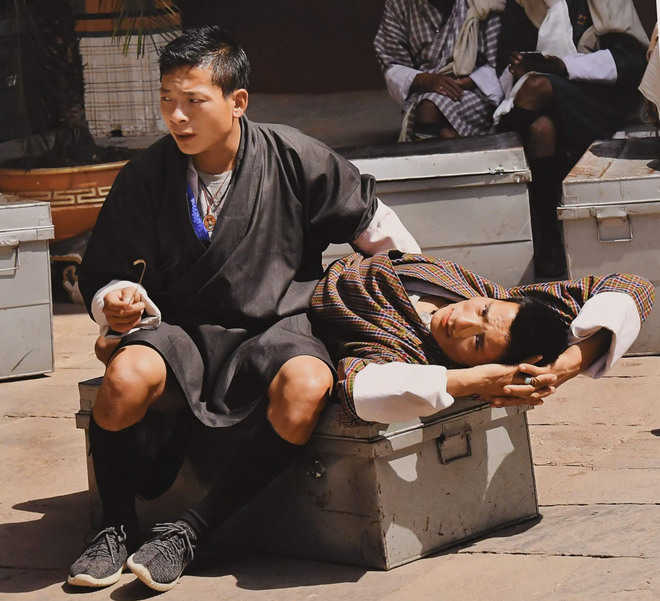A room with a view of Bhutan
Amarjot Kaur
The delightfully picturesque landscapes of Bhutan, a Buddhist kingdom on the eastern edge of Himalayas known for its monasteries and fortresses (or dzongs), breathe life into the four-walled room of Chandigarh Museum and Art Gallery at Sector 10.
The two-day photography exhibition by homeopath-turned-photographer Mukesh Batra, titled Magic Moments, displays dramatic landscapes that range from subtropical plains to steep mountains and valleys. Over 41 frames paint a vivid picture of the country’s culture and ecology elaborating on its people, culture, festivals, beliefs, and architecture. The first few pictures elaborate on how all Bhutanese people celebrate their birthdays together on January 1. “They believe that leading a happy life is more essential than the number of years lived,” reads the description note of three pictures displayed right at the entrance. The next frame captures the glory of Punakha Dzong, the largest dzong in Bhutan which was the seat of the government till 1955. “It’s name means, the place of bliss,” reads the caption.
Exploring the beautiful quarters of Bhutan, Mukesh clicks a series of detailed shots that give a bird’s eye view of various towns in the country. The maze-like serpentine roads rise from behind the steep mountains and little houses, nestled in the valley, look like a pile of matchboxes from a distance. Then comes a picture of Punakha Suspension Bridge, the longest bridge in Bhutan, connecting the dzong with villages, with the breathtaking Pho Chu River flowing below.
Over 11 portraits of Bhutanese people both, old and young provide an enriching perspective of simple lives that people of Bhutan lead. Bhutan, the world’s first and only carbon-negative country, also finds a mention in the Guinness Book of Records for the fastest mass-tree planting in the history. “As many as 49, 672 trees were planted over 25 acres of land by 100 volunteers in 60 minutes,” reads the description.
There are many pictures of phalluses painted on buildings. “It is a common sight in Bhutan and Bhutanese people believe that they aid fertility, offer protection from evil, and dispel malicious gossip,” says Mukesh.
Apart from the rare views of Mount Everest and Mount Kanchanjunga, taken from the flight, the exhibition also displays monasteries and religious beliefs of Bhutan which is also called The Kingdom of Happiness. A colourful picture of Bhutanese people, wearing masks and dancing, shows the Tshechu celebrations, an annual festival celebrated in the honour of Guru Rimpoche. “The one who witnesses the mask dances at this festival receives blessings that wash away their sins,” believe Bhutanese people.
The exhibition also shows a rare picture of Paro Airport which is considered to be one of the most dangerous airports in the world, with only eight pilots to land there, including the queen’s father.
amarjot@tribunemail.com
On till March 22.









